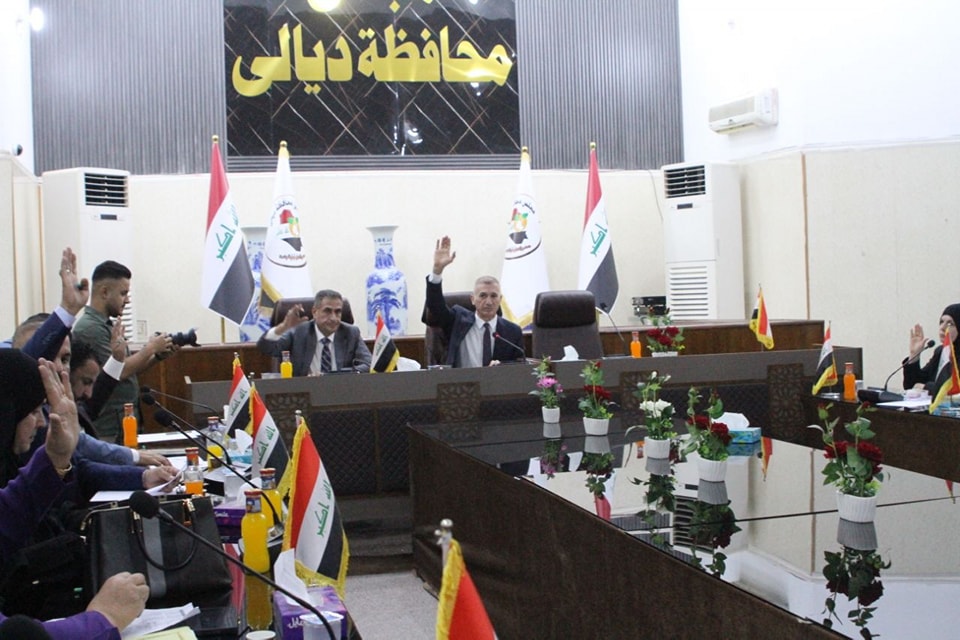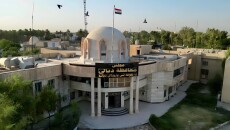Despite protests from several members, including the only representative of the Kurdish party, the Diyala provincial council elected the presidency of most standing committees and opened nominations for the heads of administrative units.
The provincial council meeting took place on Tuesday with 14 members present. It was decided to elect the chairman and vice chairman of nine committees, while four committees were postponed for another time, as stated by the council.
However, the statement did not mention the withdrawal of three members from the meeting. These members were Aws Ibrahim from the Patriotic Union of Kurdistan PUK faction, Raad Tamim from the Diyalatuna (Badr) faction, and Nizar Lihebi from the Taqadum.
"We left the meeting because this governance in Diyala is unacceptable. As the Kurdish community, we are deprived of executive and legislative power," Aws Ibrahim, a council member from the PUK faction, told KirkukNow.
"Posts and committees should be distributed through political consensus."
Previously, Kurds held positions such as deputy governor, district and sub-district mayors, especially in Khanaqin, a disputed town in Diyala.
The Diyala council voted to retain the heads of administrative units as acting executives until their positions are filled, allowing nominations for district and sub-district mayors for 30 days.
Provincial council elections have been held since December 18, 2023, but only Diyala and Kirkuk were late in forming a new local administration.
The main tasks of the provincial council, in addition to monitoring through its standing committees, are to decide on the provincial budget and approve project and service plans.
Following the formation of a new coalition called the Peace and Stability Coalition, consisting of five factions including Asaib Ahl al-Haq AAH led by hardliner Qais al-Khaz’ali, the rule of law, sovereignty, determination, foundation, and a member of Badr, tensions have risen.
Ali Hajiya, a political observer in Diyala, explained to KirkukNow that the coalition was formed to protect the current administration of the province due to rumors of changes in positions including the governor by some figures and parties.
"They flet there was a threat so they formed this alliance."
The new coalition has nine out of 15 members, excluding the PUK, which did not participate. The other parties were the same ones that held an emergency meeting earlier this month at the Rashid Hotel in Baghdad, resulting in the election of the council speaker, governor, and deputies after months of controversy.
"We have not joined any coalition yet because we aim to secure the rights of the Kurdish community, and no party has made concrete promises to us," the Kurdish member of DIyala provincial council stated.
The 15 members of the Diyala Council were first divided into two teams: The Team of Eight and the Team of Seven. The two teams include a mixture of Shiite and Sunni parties seeking to secure the largest number of senior positions in the local government in their favor.
Diyala Provincial Council consists of 15 seats, four of which are allocated to women. Diyala Governorate is home to 1.6 million people, 90,000 of whom live in the center of the Khanaqin dominantly Kurdish district, according to estimates by the Central Bureau of Statistics for 2019.
In addition to committee elections, the provincial council also appointed Fadi Lihebi as the council's secretary, Rashad Tamimi as chairman of the security and defense committees, Farqad Rubaei as chairman of the reconstruction, investment, and housing committee, Darya Khairullah as chairman of the education and media committee, Rashida Dayni as chairman of the Health Committee, Nafe Juburi as chairman of the Legal and Finance Committee, Fares Mazahem Juburi as chairman of the Energy Committee, Turki Jad'an as chairman of the Corruption Committee, and Fadi Lihebi as chairman of the Immigration Committee.
The chairmen for the committees of Sports and Youth, Agriculture, Endowments, and Planning were not determined.






